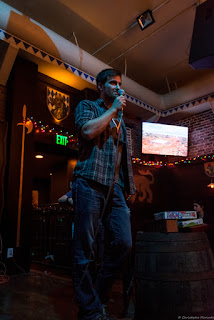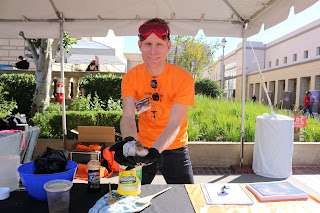Tonight's Astronomy on Tap event was an exciting one, featuring talks on some very popular topics including the search for life in the universe and black holes! Attendance was a little light, probably due to this week being the Thanksgiving holiday, but I think all the attendees had a good time regardless. We started off with a talk by Ricky Nilsson, who discussed the probability that extraterrestrial life may exist, and in what form such life might find itself. This argument featured the famous Drake Equation detailing the uncertainties in how detecting life, intelligent life, and intelligent life capable of communicating with us over the vast distances of the cosmos.


Next up was Hannalore Gerling-Dunsmore, who put together a whole game show called "Black Hole Jeopardy" for audience members. Black hole information sheets were placed around the room over the course of the night, so people could familiarize themselves with information about black holes. Then three lucky contestants were selected from our audience (professional astronomers were barred from participating). These contestants played a modification on the popular game: Jeopardy! with black hole-related questions. While Hannalore's questions were very challenging, even to those of us with formal training in astrophysics, the contestants did pretty well, and they were rewarded with NASA-related prizes like tshirts and pint glasses. I think everyone learned something about black holes from this event.


Lastly, the astronomy pub quiz had some great questions regarding the space program, cerenkov radiation, and Star Wars. Everyone got really into it, and the top 2 participants got science prizes from JPL. Thanks everyone for coming out and see you next month!
--Cameron

















































